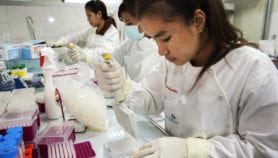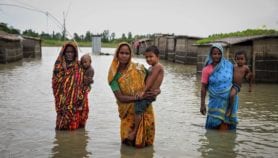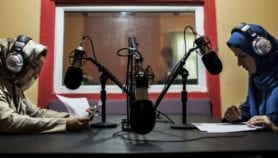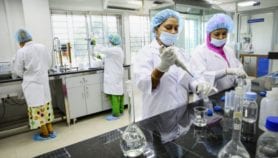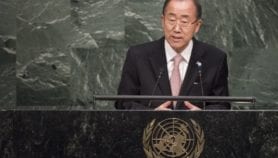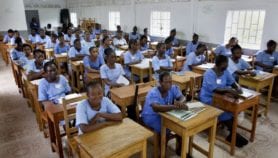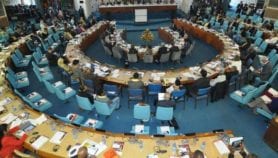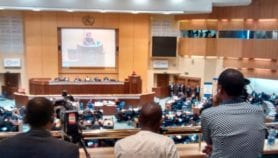Send to a friend
The details you provide on this page will not be used to send unsolicited email, and will not be sold to a 3rd party. See privacy policy.
Kofi Annan, the secretary-general of the United Nations, has announced plans to create a high-level advisory panel to help integrate science and technology into the development efforts of all the member organisations of the UN system.
The panel’s two dozen members, made up of “leading scientists, policymaking officials and political leaders”, will advise both Annan and the United Nations Development Group on the best ways to support the achievement of the UN Millennium Development Goals.
In particular, the panel — to be known as the Council of Development Advisers partly to emphasise its breadth of approach — “will issue periodic reports and commentaries, and will liaise with scientific, civil society and other bodies with relevant expertise”, according to Annan.
Annan has also announced that he is to appoint a scientific advisor to provide “strategic forward-looking” scientific advice on policy matters, with responsibility for “mobilising scientific and technological expertise within the United Nations system and from the broader scientific and academic community”.
One of the key roles of the science advisor will be to work closely with the new council.
Both the creation of the advisory panel and the appointment of a science advisor form part of a broad set of reforms in the operation of the United Nations that were proposed by Annan in a speech to the UN General Assembly in New York, United States, yesterday (21 March).
The reforms are intended to update the role of the United Nations and the way it operates, both in the face of the global challenges facing the international community, and in the context of recent criticisms about its external and internal functioning.
On the one hand, Annan’s recommendations provide a new emphasis on the importance of economic growth as a means of combating poverty (significantly, for example, yesterday’s announcement made no mention of the Poverty Research Strategy Papers, which have been the main UN instrument for achieving this goal in recent years).
At the same time, the recommendations also emphasise more than previously the need to combat international terrorism and for increased biosecurity, both high priorities of the US administration, which has shown its determination to ensure that the UN pursues policies of which it approves.
In terms of the first set of objectives, many of the proposed reforms are intended to address ways in which the United Nations, through it members states, can achieve the Millennium Development Goals that were endorsed by the UN General Assembly in its Millennium Declaration.
“The unprecedented combination of resources and technology at our disposal today means that we are truly the first generation with the tools, the knowledge and the resources to meet the commitment, given by all states in the Millennium Declaration, ‘to making the right to development a reality for everyone and to freeing the entire human race from want’,” said Annan.
In order to pursue this goal, said Annan, developing countries needed, among other requirements, to build national capacities in science, technology, and innovation, including the ability to make use of information and communications technology.
In turn, he said, achieving this required governments to “establish scientific advisory bodies, promote infrastructure as an opportunity for technological learning, expand science and engineering faculties, and stress development and business applications in science and technology curricula”.
These proposals echo the recent conclusions of the Millennium Project, headed by Jeffrey Sachs, director of the Earth Institute at Columbia University in New York, whose report was based on the work of ten ‘task forces’ made up of 265 scientists, economists, and other development experts (see Ending poverty ‘needs massive science funding boost’).
Annan also picked up on the Millennium Project’s recommendation for a significantly increased global effort to support research and development to address the special needs of the poor in the areas of health, agriculture, natural resource and environmental management, energy and climate.
“Two particular priorities should be to mount a major global initiative on research in tropical diseases and to provide additional support to the Consultative Group on International Agricultural Research for research on tropical agriculture,” he said.
Explaining his decision to create a new scientific advisory mechanism, Annan said that in recent years “I have been gratified by the benefits that the United Nations system has derived from working closely with independent scientists, policymakers and political leaders around the world”.
This was particularly true in the field of development, “where we need constantly to integrate the latest advances in science and technology into the practice of our organisations and programmes”.
 Calestous Juma |
“Implementing relevant measures that bring scientific knowledge to the centre of diplomatic activity will strengthen the role of the United Nations as leader in the governance of global affairs,” Juma told SciDev.Net.
“More importantly, the United Nations should become a pioneer in redefining the role of technological innovation in development, and help provide ideas that can modernise development policy at the national and international levels.”
In his announcement, Annan also underlined the importance of the work of the Commission for Africa, which was set up by the United Kingdom, and reported its conclusions — including the need for greater support for capacity building — earlier this month (see Science capacity ‘imperative’ for Africa’s development).
“Africa’s leaders and people will need special support from the rest of the world to succeed in these pioneering efforts,” he said. “The international community must respond to this need. It must give tangible and sustained support to African countries and regional and sub-regional organisations.”
Addressing the issue of climate change, Annan hailed last month’s entry into force of the Kyoto Protocol, but pointed out that it only extends until 2012, and that the international community needed to agree on stabilisation targets for greenhouse gas concentrations beyond that date.
“Scientific advances and technological innovation have an important role to play in mitigating climate change and in facilitating adaptation to the new conditions,” he said. “They must be mobilised now if we are to develop the tools needed in time.”
In particular, research and development funding for renewable energy sources, carbon management and energy efficiency “needs to increase substantially”, said Annan. But he added, in what many see as a veiled reference to US foot-dragging, that “the primary responsibility for mitigating climate change and other unsustainable patterns of production and consumption must lie with the countries that contribute most to the problems”.
A more inclusive international framework was needed beyond 2012, said Annan. This would require broader participation by all major emitters and both developed and developing countries to ensure a concerted globally defined action, including using technological innovation, to mitigate climate change.
Annan’s proposals for the reform of the United Nations will be the subject of a special meeting of the UN General Assembly, to be held in New York in September 2005.
Link to secretary-general’s report In Larger Freedom


